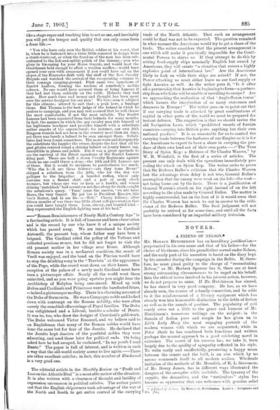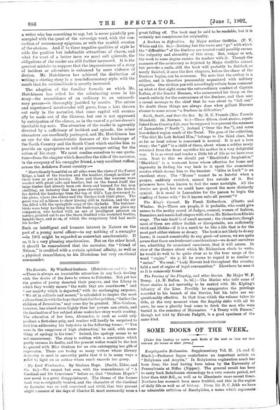NOVELS.
A FRIEND OF NELSON.* MR. HORACE HUTCHINSON has an hereditary justification— perpetuated in his own name and that of his father—for the choice of his theme, since his grandfather served under Nelson, and the early part of his narrative is based on the diary kept by his ancestor during the campaign in the Baltic. If, there- fore, he must plead guilty to the charge of " resuscitating Nelson," as Mr. Herbert Spencer has it, there are at least strong extenuating circumstances to be urged on his behalf. Into the ethical issues involved in his present action, however, we do not propose to enter. If Mr. Hutchinson has sinned, he has sinned in very good company. He has, as we have already seen, the excuse of a family connection, and he adds to it the reinforcement of a literary equipment which has already won him honourable distinction iu the fields of fiction as well as in the annals of pastime. The popularity of golf surely owes not a little to the grace and humour of Mr. Hutchinson's numerous writings on the subject: in the domain of fiction pure and simple he has given us in little Lady Mary the most engaging portrait of the modern woman with which we are acquainted; while in Peter Steele ho has combined both functions and written perhaps the nearest approach to a good cricketing novel in existence. The secret of his success has, we take it, been largely due to the quality of sympathy reflected in his style. To write easily and unaffectedly, preserving a happy mean between the ornate and the bald, is an aim which by no means commends itself to all modern scribes. Wholesale imitation of the methods of Mr. Meredith, of R. L. Stevenson, of Mr. Henry James, has in different ways illustrated the dangers of the exemplar rails inritabile. The tyranny of the cryptic, the decorative, and the " meticulous " styles has become so oppressive that one welcomes with genuine relief • A Friend of _Nelson. Hy Horace U. Hutchinson. London : Longman and Co. L68.1 a writer who has something to say, but is never painfully pre- occupied with the quest of the sovereign word, with the con- coction of unnecessary epigrams, or with the morbid evasion of the obvious. And if to these negative qualities of style he adds the positive but indefinable attractions of charm, and what for want of a better term we must call quietude, the obligations of the reader are still further increased. It is the greatest mistake to suppose that the impressiveness of a story of incident or adventure is enhanced by mere violence of diction. Mr. Hutchinson has achieved the distinction of writing a stirring story in a non-inflammatory style, with the result that its verisimilitude is greatly increased.
The adoption of the familiar formula on which Mr. Hutchinson has relied for the culminating scene in his story—the resemblance of an ordinary to an extraordi- nary person—is thoroughly justified by results. The astute and experienced novel-reader will guess, from a hint thrown out early in the narrative, that some capital will eventu- ally be made out of the likeness, but one is not oppressed by anticipation of the climax, as in the case of a prima donna's inevitable top note. The attention of the reader is agreeably diverted by a sufficiency of incident and episode, the minor characters are excellently portrayed, and Mr. Hutchinson has an eye for the characteristic features of the landscape of the South Country and the South Coast which enables him to provide an appropriate as well as picturesque setting for the action of his story. We must confine ourselves to one quota- tion—from the chapter which describes the ride of the narrator, in the company of his smuggler friend, a very excellent ruffian, across the Ashdown Forest country :— " Marvellously beautiful on all sides were the views of the Forest Ridge, a land of the bracken and the heather, though neither of these were as yet in beauty. Here and there the warrens were wooded with great oaks and beeches, but on the forest itself the large timber had already been cut down and burned for the iron smelting, an industry that has gone elsewhere. But the Scotch firs dotted the landscape from the top of Gill's Lap downward to the glens, where the elders and the birches took their place. The gorse was all a-bloom to show kissing still in fashion, and the air was filled with the springtide song of the skylarks. The butcher- birds were busy hawking from the bush-tops, and at one place my companion, who looked with an eye of intelligent interest on nature, pointed out to me the thorn studded with wretched beetles, bumble-bees, and so on, of which the sanguinary bird had made his larder."
Such an intelligent and humane interest in Nature on the part of a young naval officer—to say nothing of a smuggler —in 1803 might be regarded as somewhat anachronistic. If so, it is a very pleasing anachronism. But on the other hand, it should be remembered that the narrator, the "friend of Nelson," is credited with a certain spiritual affinity, as well as a physical resemblance, to his illustrious but very emotional commander.







































 Previous page
Previous page